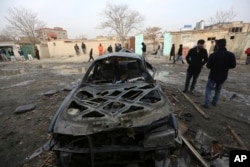U.S. military officials insist Afghan forces are carrying the burden when it comes to securing and stabilizing the country, but there are questions as to whether U.S. special forces could soon be playing an increasingly active role.
"There hasn't been any signaling of that yet," a U.S. official told VOA. "The primary role there is to train, advise and assist."
Still, the official said U.S. special forces have been highly engaged in Afghanistan and that the current approach could change if the Taliban finds a way to expand on gains from the past year, provided the Afghan government agrees.
"It's best to leave that responsibility to the host nation itself," the official said.
Questions about the role of U.S. special forces in Afghanistan have been simmering since a U.S. Green Beret, Staff Sgt. Matthew McClintock, was killed earlier this month in Marjah, in Helmand Province, when his unit came under fire from the Taliban.
The mission for McClintock's team — training Afghan special forces — is "not unusual," the official said. Nor is the context, described as being part of a larger Afghan counteroffensive against the Taliban.
"With the Afghan special forces, that's conducted down to the tactical level, and so that was what was going on in this case," Army Brig. Gen. Wilson Shoffner said during a briefing in Afghanistan.
"The force that was there, the American special forces team, is designed to operate independently, which it was doing," Shoffner added. "Combined with the Afghans, they did have sufficient combat power on hand for the threat that they faced, and they had sufficient airpower available to them throughout the operation."
Expanded role
The U.S. has relied heavily on special forces for its train, advise and assist efforts in Iraq and Syria. The Defense Department expanded the role of special forces last month with the creation of a specialized expeditionary targeting force that would conduct raids, gather intelligence and target Islamic State commanders.
"You don't know at night who's going to be coming through the window," Defense Secretary Ash Carter told lawmakers at the time. "That's the sensation we want all of ISIL's leadership and followers to have."
ISIL is an acronym for the Islamic State.
For now, though, U.S. officials say that type of presence is not needed in Afghanistan, where the Taliban control just nine of the country's more than 400 districts, while wielding influence in another 17.
U.S. officials also say that, despite making some gains over the past year, the Taliban is having trouble holding onto those gains and is experiencing difficulty governing the areas it does control. They also say Afghanistan's forces are steadily improving, becoming more capable from one operation to the next.
Optimism, setbacks
U.S. officials admit that while there is reason for optimism, Afghan forces have had only mixed results as they have begun to shoulder more responsibility.
"When they conducted deliberate, planned operations they actually did fairly well," said Army Brig. Gen. Shoffner. "Where they had trouble and where they didn't do so well was in response to crisis situations. That remains one of their weaknesses."
U.S. officials also are concerned about the commanders of Afghanistan's armed forces, including the leadership of the country's 215th Corps, which operates in Helmand Province.
The commander of Afghanistan's 215th Corps already has been switched out, and two brigade commanders have been replaced, as well as key staff members.
"They've got some leaders that are corrupt and need to go," Shoffner said. "They need to make some tough leadership choices."
Additionally, recruiting has been a problem. The Afghan National Army currently is facing a 25,000-soldier shortfall, although Afghan officials are hoping to fill those positions within the next six months.






